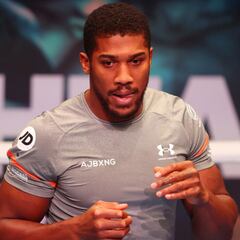Eliud Kipchoge: "training hurts more than a marathon"
The two-time Olympic gold medalist spoke to AS on his career highs and lows, his routines and, more importantly, his hopes for the future.
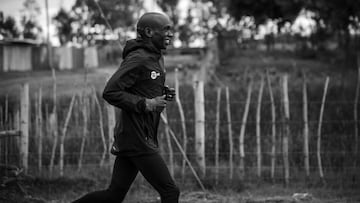
He's been called a pioneer, an inspiration and even the greatest of all time, but opinion aside, Eliud Kipchoge’s history-making sub-two-hour marathon in Vienna in October 2019 sets him apart from the rest of the pack. Humble by nature, Kipchoge is often seen as a reference for the old adage "slow and solid wins the race" ...except he isn't slow. The two-time Olympic gold medalist continues to push the limits of human capability when it comes to marathons.
Previous Kipchoge stories:
- Kipchoge's joy at completing first sub-two hour marathon
- Kipchoge breaks two-hour barrier in the marathon: 1:59:40
- Kipchoge smashes marathon world record in Berlin
- Kipchoge narrowly misses two-hour Monza marathon attempt
- Kipchoge wins marathon gold for Kenya in Rio
Eliud Kipchoge: the legend
In 2019 Kipchoge was the subject of a new documentary film – Kipchoge: The Last Milestone. In the film, viewers were treated to a more intimate view of the champion as he prepared for the record breaking day at the INEOS event in Vienna when he became the first man in history to run a marathon in less than two hours.
Most recently, AS sat down with the legend at his home in Kenya and were granted an all access conversation with the marathon icon at his NN Running Team camp in Kaptagat. Among the topics discussed were his training methods, diet, highs and lows, hopes for the next generation, daily routines and, intriguingly, who he prefers between Real Madrid and FC Barcelona.
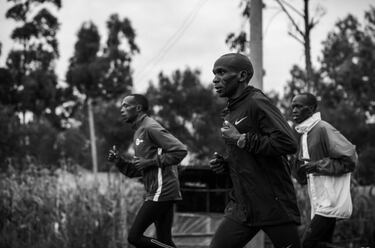
Kipchoge hopes to inspire the next generation
Speaking candidly with AS Kipchoge explained that he hopes to one day travel the world as an ambassador of sport, encouraging people to participate in whatever way they can. With his humble and quiet demeanor one can only imagine that when coupled with his incomparable list of achievements, it makes for a mentor that's hard to ignore.
After a number of pleasantries we got down to business. Below is the transcript from the interview...
Interviewer: How has life been in Tokyo?
Kipchoge: It has been good, it's been busy.
Interviewer: Did you take much time off?
Kipchoge: Yes, I took a few weeks off?
Interviewer: Nice. How did you spend those weeks?
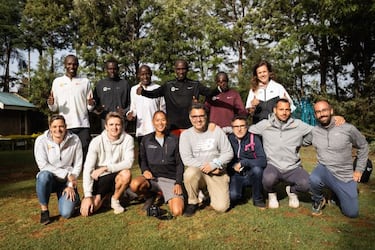
Kipchoge: I spent it by just meeting people, visiting people and spending time at home.
Interviewer: I know you've always said you hate celebrations. Was there any celebration this time?
Kipchoge: No, I can do my celebrations when I arrive at the finish line.
Interviewer: Did you celebrate in Sapporo?
Kipchoge: Yeah, I celebrated on the finish line (laughter)
Interviewer: On that point then is there something about the idea of celebrations that you think might get into your mentality or might give the wrong impression that you don't like having a big thing for yourself? Or if someone tries to have a big thing for you?
Kipchoge: I don't think it's a big deal when other people post it but I can of course celebrate at the finish line and above all, it's that a huge celebration is actually putting more responsibility on yourself. So it's good to just know how to handle your pressure, how to handle your next course. We're celebrating actually means sometimes people give you more call of duty so it's good to go back, analyze what has happened? I follow the advice of Steve Covey says that it starts and ends in your mind, that means just work hard and internalize all your work.
Interviewer: And as you start the process of getting fitter again. Is motivation ever difficult, when you have so many achievements, or is it just like clockwork?
Kipchoge: Sometimes it's difficult because of all the pressure and everybody is expecting you to be more fit in two days. That's not possible. But all the people around me have been truly supportive.
Interviewer: In terms of your training, we've got a good insight this weekend into how you train. We were talking to Patrick yesterday. Has your training changed much this last year relative to what it was 5-10 years ago?
Kipchoge: Not at all. Nothing has really changed. But more so there has been more CSM training and actually being more professional maybe. So maybe that's the change. But all in all, it's the same code, the same thinking.And as you look back on your career, it's been around 20 years, I guess, towards the top.
Interviewer: Are there any mistakes you made in the early years that you realize now that you learned from?
Kipchoge: I don't deny making mistakes but I can say during track and field I enjoyed what happened. I don't deny i have a lot of mistakes but i just...I think I have been on the right lane all the time.
Interviewer: You mentioned Steven Covey and I love his book "The Seven Habits". I wanted to try to get into some of the the mental aspects and maybe specifically even during the race. I'm a runner myself; I run marathons and I know it can get very tough near the end. What goes through your mind as you're running a marathon whether it be when you're going for a specific time or say like the Olympic marathon when you're running for a place. What do you think about halfway through, towards the end and what motivates you to keep going?
Kipchoge: During the race, there's a lot going on in my mind, but I tried to block all other things that are coming in and I reach for and try to concentrate or really maintain the right pace, the feelings in my muscles and my body, how it responds to the distance at the right time; and focusing fully on the finishing line and trying to perform well. I am trying to be present in the race all the time. Many things coming in but i try to, when it comes in I try to block and just try to concentrate more on the performance.
Interviewer: I think one thing that you're almost famous for is it doesn't really appear like you're in a lot of pain during some of these races, near the end of the race, you kind of smile during that. Can you discuss how much physical pain you feel like you're in compared to in training or in other parts of your life and how do you manage to do that?
Kipchoge: I think more pain is definitely in training. But if I actually get enough time to train for a marathon, like for four or five months, 3 and a half, 4,5 months then that's what gives me actually to my mind to be really in peace when I'm running because I know eject a lot from my my muscles and my legs and my whole body. I've done enough so I don't lose the joy of running. I am not sure that I maintain the same pace, maintain the same posture of running, enjoying what I do all the time. So always believe in exploration and planning but I don't believe in success.
Interviewer: What has been your most challenging race that you've ran? Was it INEOS 159?
Kipchoge: It's INEOS 159 because you're running alone. yourself totally because it's learning alone. You are a totally new person and the whole world is seeing you perform and make history. and when you really sit down and think what other people are saying in the world, 'what will happen if I missed? what will happen if something happens and you retire from the race?' What is the impact from the whole world? So it's really hard and that's why I always say it's the most challenging and I am happy that I enjoyed.
Interviewer: How do you manage though that pressure you mentioned, like the morning of, 'you couldn't sleep if you were getting up really early,' what goes on in your head and how do you convince yourself?
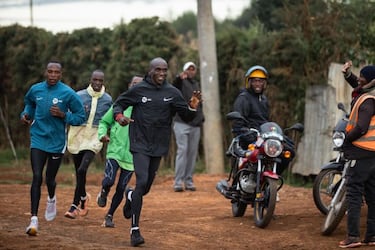
Kipchoge: first and foremost my mind was really calm. All my trainings would stop at 80% without any pain and in a happy way. but a huge challenge was the pressure from the outside world either from the media, either from the fans, either from the company, either from the sponsors. everybody that wants you to perform. but i am happy that they understand what the sport is.
Interviewer: Patrick Sands said to us yesterday that you maintain the fire; the fire to keep running; to continue competing. What is the secret to maintaining that fire?
Kipchoge: The secret is being professional, respecting the sport, respecting what I am doing everyday, leaving other things apart and concentrating on my career.
Interviewer: You have a lot of titles, a lot of medals, but you are a pioneer for innovation and you made the challenge like Monza and Vienna. Do you consider yourself a pioneer in track and field and athletics?
Kipchoge: (laughter) Maybe, maybe not!
Interviewer: Another aspect you develop is the shoes. You stay really close to the advancement of the new shoes, right?
Kipchoge: In this world, development and technologies go hand in hand. And shoes cannot be left behind because this is the only way to run in a good way, in a happy way and perform well. It's not about real performance but it's about that if you recover, that if you train really hard, then your muscles can recover faster. You need a shoe not really to take all the impact, but to reduce some of the impact on your muscles.
Interviewer: What are the similarities and the differences between 2003 and now?
Kipchoge: In 2003 I think I was still young and I was still learning, learning how to cope and know what's going on in the world. Now I am old, although I am still learning how to run in marathons. I think I learned more from the track but I'm still learning more in marathon. But I'm enjoying it.
Interviewer: You are a superstar but you never think of changing the place where you train. You are happy here in Kaptagat right?
Kipchoge: You know that what makes somebody successful is the small things. It's actually what makes me to be successful. That's why I'm still sticking where I started. And I trust my I will end my career here.
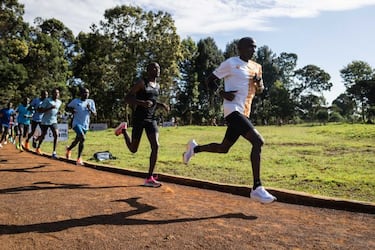
Interviewer:Can I ask a few more questions about your routine and your training. What's normal you know in terms of time that you get up in the morning? What time do you go to sleep and do you nap during the day?
Kipchoge: I get up at 5am, to get prepared for the morning. By 6am, I'm on the road. I come back to take a shower. I go for breakfast, relax a little bit see what's going on in the world a bit through social media. Maybe then do some the exercises, relax a little bit, have lunch, try to nap for an hour in the afternoon. Later I take tea and just go and relax. And by nine o'clock, I'm in the bed.
Interviewer: I was talking to one of the medalists in Tokyo last year, Bashir Abdi and he was telling me recently how he was on the way back from the portal to Tokyo with you and him and like on their phones all the time. And he just said that you were like put your phone down you're completely chilled just like thinking the whole time. Do you? You mentioned I guess you know in terms of the mindfulness and things like that you see something sometimes bad with us being on our phones all the time and addiction to technology and are you always okay thinking in your own mind?
Kipchoge: I'm okay thinking in my mind and also technology is cool for me I always close everything but only noticed when I finished training in the morning I don't see my phone until after taking a tea. Of course I'm trying to be more present in where i am. I just take a shower and try to take care of my body. Then I have a look at my cell phone and the messages and what information is there. If I need to call somebody. but i cant really take my phone to training.
Interviewer: In terms of your training then you know we not the track session. Like which of those do you find the hardest? Which do you think is most important?
Kipchoge: Long runs on Fast Track training are really important but also very dedicated nation accredited programes are really kudos for the muscles because it makes your muscle to recover for data and it adds more mileage on your name.
Interviewer: Typically training is probably 200 kilometers per week. Is that normal? in terms of recovery and or did the work we saw today the athletes doing is that Do you think that's important that you've added the last few years to keep the injuries away?
Kipchoge: Yes, exercises are really important for cutting injuries and making you fitter.
Interviewer: Do you ever run all out in training? 100%?I try not to run more than 68-70km.Is that because you have three sessions every week and it would be counterproductive to go too hard in any one of them?
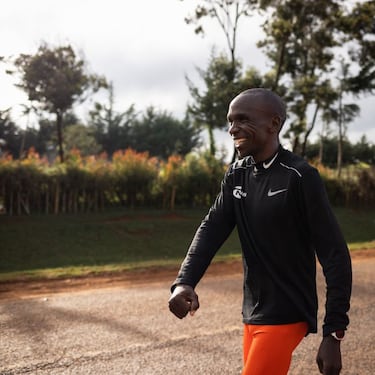
Kipchoge: I should perform over 80% on Tuesday, Thursday and Saturday. I then I should perform at 50% Friday on Sunday, Monday and Wednesday.
Interviewer: So the the Kipchoge movie was called 'The Last Milestone'. What does the last milestone mean to you and is there another milestone for yourself beyond that?
Kipchoge: The movie means a lot to me, it means not even to me myself, but I'm happy to see it. Last night, myself, happy to see many people are getting interested in watching the movie and getting inspired. My happiness is in seeing inspiration. So, on behalf of a man who was put in this world and inspired to run.And to Live a positive way. I think the future will tell us for us the medical next it's not that open, but the future will tell what will happen.
Interviewer: Okay, can you tell us a little bit about how you have built trust with your coach Patrick over over the years and how you don't question his training methods and just continue to go through it day by day.
Kipchoge: Oh, I've been with Patrick a long time because he's my life coach, my business coach and my sport coach. So all in all is that what I'm trying to say is that he is a teacher and I am a student. And like other students they, respect their teachers, asking questions and doing what the teacher is doing. It is like a child and a parent.
Interviewer: So maybe on that topic, you have children. What do they think of your running career and do you think that they're gonna follow in your footsteps and become runners?
Kipchoge: I don't think they understand what i am doing in sport but they jnow that I am running and I trust they will luckily follow in my footsteps but I leave them to decide the sport they would like to take. They want to play football or ride a bike, or try basketball.
Interviewer: So I hear that you like to watch Formula One . What's your favourite team? And then kind of going along with that what is a team or person or other athlete that you look up to or respect in other sports?
Kipchoge: Formula One my favourite team is Mercedes. And my favorite driver is Lewis Hamilton. I look up to Roger Federer. I really follow LeBron James in basketball, seeing what people are doing. I watch many, many sports I follow Fabio Quartararo in Moto GP.
Interviewer: Are there any certain things about their personalities that you like in particular?
Kipchoge: I like their concentration, you know somebody driving a motorbike at 250 kilometres per hour is really crazy but they still perform well.
Interviewer: Do you also follow a football club?
Kipchoge: I am a fan of Tottenham in the Premier League, I like AJax in Holland, PSG in France and Barca in Spain.
Interviewer: Do you prefer Barca than Real Madrid?
Kipchoge: Yes I prefer Barca (laughs).
Interviewer: What are the three best moments of your career?
Kipchoge: If I can choose three, the two Olympic Games and INEOS
Interviewer: The one obviously unlucky day you had was London in the last seven years or so. Did that leave not a scar but did that leave you your mentality a little bit iffy until Enschede and Sapporo.
Kipchoge: If somebody hits you, like an electric shocks tends to occur in thin copper. But when you realise that those are the challenges, then you go back, train harder and come back in a full suit. You can erase it from the mind, but it should be there for me to learn more.
Interviewer: Obviously you've reached the level of fame everywhere, but especially in Kenya, that's out of this world and can it present challenges given that you like to lead such a very humble, normal life, where you can't really go out in public like you used to 10 or 20 years ago?
Kipchoge: It's really hard to walk around, it's really hard but I understand and I just try with my all to still stay low and calm.
Interviewer: Have you talked to young athletes here about the fact there are some other people in other camps, doctors and others, that could try to bring them to the bad side?
Kipchoge: Yes, I'm taking my time to talk to young athletes, whenever I get a platform. I help them and talk to them, teaching them about how to live life and live in a positive way in sport, to think of a career and to be more professional.
Interviewer: It must be tempting when you have made a lot of money you know, we've seen so many athletes that flash their money and build the big house, etc. But why for you is it so important to reject that side of life for now while you're still an athlete?
Kipchoge: I think that staying out of the flashy light has given me more time to go and be the the person I need to be. Its so simple as this. I still work hard, as hard as I can so I can actually concentrate in a high level instead of driving flashy cars for exampe which I think can bring you down as far as performance is concerned.
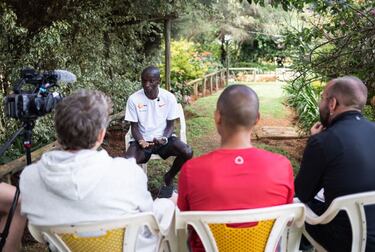
Interviewer: Am I right in saying you've never drank alcohol is that primarily you think because of athletics in terms of your training? Or do you think even if you stopped you don't think you'd really go down that road?
Kipchoge: Yes, I don't drink alcohol. And even if stopped, I'm not going to drink. It's not in my mentality. You know, I know that if you drink then you forget some things. I don't want to forget, I want to live a life whereby the young generation and those who are not informed can actually see the positive part in [not drinking alcohol].
Interviewer: And what makes Eliud Kipchoge happy or happiest?
Kipchoge: Oh, it's the inspiration and I go around and see the kids actully chanting and wanting to be there helping. People are clearly making their countries beautiful and actually respecting people and building their own
Interviewer: You're such a nice guy and so calm exterior that people don't see a lot of times the competitor in you. Is there beneath the surface is there a very competitive person? Are you competitive in other stuff besides running like if you're playing table tennis or something?
Kipchoge: I put more on athletics and I call that 'the' sport instead of just finding another sport to be a little bit more competitive and keep myself busy.
Interviewer: Can you tell us a little bit about how you interact with the teammates and I know that you inspire them but how do they inspire you and how do you build off of their teamwork?
Kipchoge: You know, we think different, I don't define team as a group of people staying together but we define team as a group that is trusting each other. Thats what has made us actually train to the best of our level for that long. And I can say the trust cements our team or our teamwork and this is what I call effectiveness.
Interviewer: You have a phrase of Paulo Coelho and its 'nobody can lie to himself'.
Kipchoge: Yes, yes, it's a good phrase to tell you to go out and do what you have to do, because you have to do it alone. And you dont do for somebody else. You have to do it for yourself and if you lie that you have done something then you are not aligned with yourself. So it's at it's a core to have a premise or at least clearly on the course everybody wants and to know you[re own. Paulo Coelho once says 'if you want to be successful never lie to yourself.' With principle all the people can live the right course.
Interviewer: Do you read much philosophy and things like that?
Kipchoge: I tried to read more all sorts of folks to get more knowledge and try to hear how people think.
Interviewer: What do you read now? What's on your bedside table?
Kipchoge: I'm reading a small book about mindfulness
Interviewer: Are you practising mindfulness?
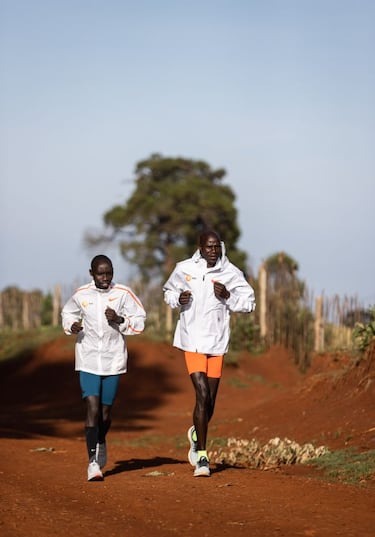
Kipchoge: Yes, I think it makes me more present where i am.
Interviewer: As you look to the future, you know, towards next year, what are the plans? You think? What would you like to do and achieve?
Kipchoge: Oh, I would like to try The next three, three more world mega marathons. Next six..So you want to do New York, Tokyo, and Boston.
Interviewer: And what do you think are the ingredients that's allowed you to compete for so long and do you physically at all feel like your body is getting more difficult? Or does it still feel because to the outsider it looks like you're still as young as ever?
Kipchoge: Oh, I'm trying to train as good as I am. For load required. But what makes me to stay for a long time is self discipline that I set my priorities right.I try to say no to too eating too much. Actually I know it's not efficient. I believe in planning and preparation, it can actually stay on the course. I love the consistency. It just occurred to me, but my career lows and highs are made up of all sorts of small habits which actually contributed to my longevity. That's why That's what has kept me the way I am for that long.
Inteviewer: I know we asked this earlier, but in the marathon what is your mindset? What typically do you talk to yourself about if at all? You know, I know Paula Radcliffe, when it got very hard. I think she used to count to 100 three times and then that would be one mile just to distract from the pain. Do you have any trick like that you use?
Kipchoge: No no, i dont have any trick. just focus and run.
Interviewer: If you could offer some advice to any marathoner, whether it be a 3 hour marathoner, two thirty or four hour, what are the ingredients that makes a marathon preparation go correctly from your experience?
Kipchoge: The first thing is to agree and to say “I’m going to run a marathon.” Second is to train consistently. You know train and train and that’s what will make that runner to break a two and a half or three hour. So that consistency really brings a huge impact. So consistency of training well, taking the right shoes and taking care of your protocols for massage.
Interviewer: And if there is one mistake you see people make, what would be the big mistake?
Kipchoge: The big mistake is not hydrating well and just running alone. The time will be empty and you will sweat a lot and you can’t run again.
Interviewer: How do you see in the future in the long term after your career?
Kipchoge: I think the future will be good. I think the future will be marathon, the whole localization in marathon. I think people will go running.
Interviewer: And you in the future? A role as athletics ambassador? Partner?
Related stories
Kipchoge: I think I will play a role of athletics ambassador and go around the world and encourage people to love sport.
Interviewer: Thank you so much, it’s been fascinating and we very much appreciate your time and if we don’t see you again, take care!

